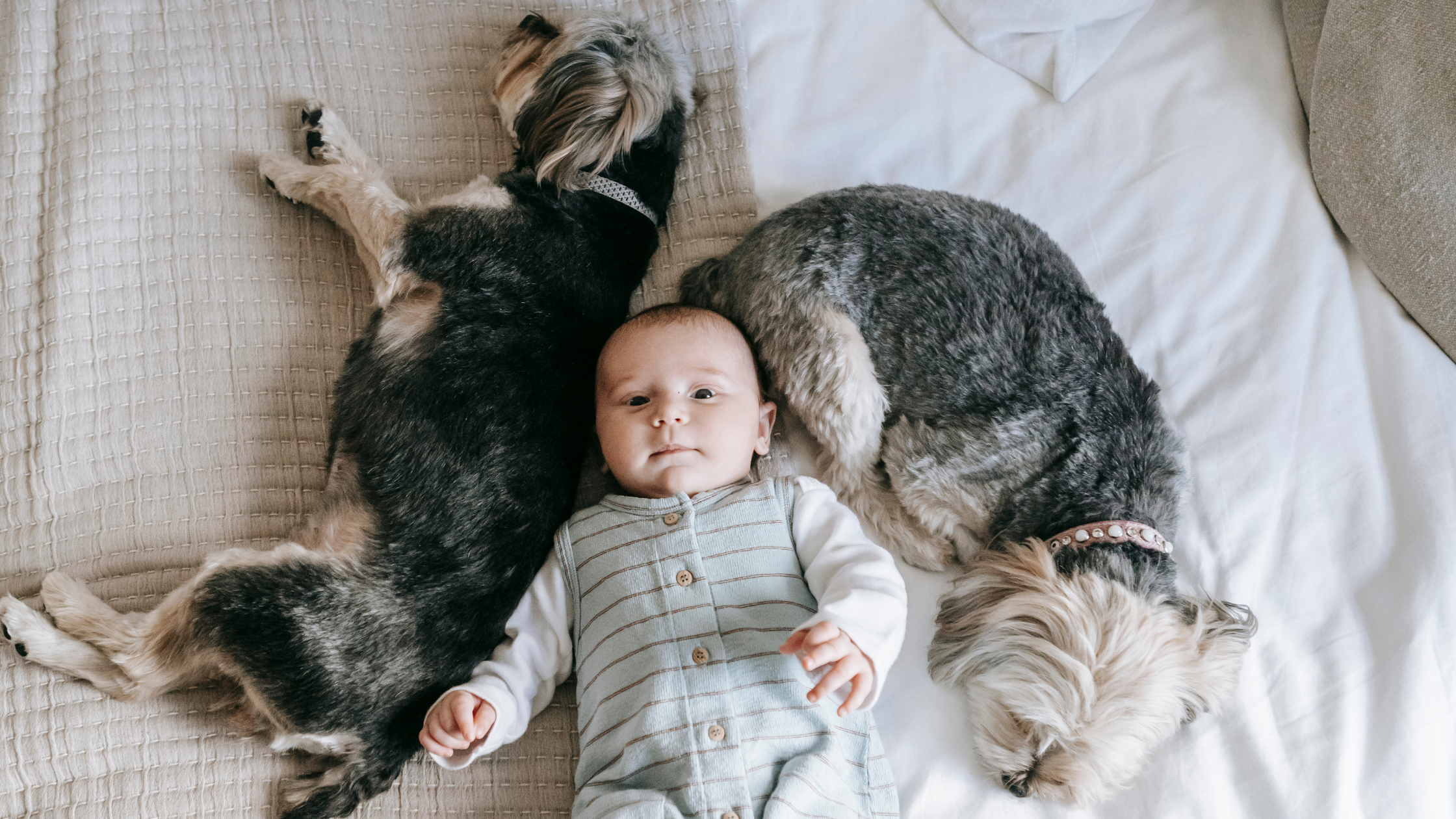Bringing home a new baby can be one of life’s most exciting and momentous occasions. There are so many things to prepare for ahead of time, from planning a nursery to washing all those tiny socks, and everything in between. For homes with canine family members, preparing for this major change is also part of the puzzle, especially if your four-legged baby has been the center of attention up to this point. Read on for how to prepare your dog for a new baby.
While there’s no way to explain to your dog(s) what’s about to happen, there are a number of things you can do to help prepare them as much as possible for their new sibling. Of course, these tips should only serve as a starting point. Each dog has its own specific needs and will have its own unique response to a new baby, so be sure to pay close attention to your dog’s cues and make adjustments as needed.
During Pregnancy
Sharpen your dog’s listening skills
With a new baby, it may be more important than ever that your dog is able to follow your commands. You may consider regularly reviewing and practicing some basic commands before baby arrives, such as stay, down, away, on/off, and your dog’s go to cue (instructing them to go to a certain location, like their crate).
Consider all potential impacts to the dog’s lifestyle
Dogs are very sensitive to changes to their environment. It will be helpful to consider in advance all the ways a new baby is going to impact your dog’s space and routines, and give them as much advance training as possible. Set up baby items in advance, and introduce them to new objects one at a time. Because baby’s cries can be upsetting to some dogs, you may also research techniques for helping them adjust to the new sounds that will soon be filling their home.
Identify safe zones
Install safety gates or utilize playpens to designate some rooms as off limit to your dog, leaving baby free to roll and crawl freely. Get your dog used to these dog-free zones as early in pregnancy as possible, so they aren’t taken aback when baby arrives.
Be realistic in your expectations
Every dog is different. Some dogs have unexpected reactions to a new baby, but generally speaking, you know your dog and their limits better than anyone. You likely already have some idea of how your dog might handle this major life change. Try to plan as much as you can in advance, but remember to trust your instincts as well.
From the Hospital
Bring home a blanket with the baby’s scent as soon as you can
This helps the dog become familiar with the baby’s scent before they come home from the hospital, which can make the initial meeting more comfortable for the dog.
Maintain routine, where possible
It can be challenging to not disrupt a dog’s routine once you’ve gone into labor and baby is coming. Having a familiar dog sitter on call or a kennel that the dog is already used to can help keep your dog’s stress levels down while you’re away, making your return home smoother.
Bringing Baby Home
Don’t rush the meeting
Slow is best when introducing your new baby to your dog. While it’s tempting to want a beautiful, TikTok-worthy moment of your dog and baby falling madly in love with at first sniff, your dog is more likely to accept your baby if its able to do so on its own time. This Canine Journal article has some helpful tips of how to best introduce your dog to your baby.
Always supervise when baby and dog are together
Even if they’re not being aggressive, your dog may unintentionally harm your baby with an overly excited paw or tail. It’s always a good rule of thumb to stay alert when your dog and baby are together, from the newborn stage through toddlerhood (and beyond, depending on the dog).
Follow the dog’s lead
According to The Farmer’s Dog, “New parents may find that their pup is hanging around during meals, bath time, tummy time, or other activities. These could be the experiences your pup is most receptive to.”
Paying attention to your dogs cues can help you identify the best ways to invite your dog to get to know your baby. You should reward them frequently when you catch them exhibiting positive behaviors, especially as it pertains to the baby. This helps them have increasingly positive associations with the baby, and continue to feel part of the family.
Stick with routines
This is certainly easier said than done with a new baby, but it is important to strive to give your dog the same amount of attention they received before baby was born. Maintaining small, but familiar routines for the dog like feeding times and walking the same route around the neighborhood can help them transition more quickly to their newly expanded family life.
In a two-parent household, the parent who did not birth the baby may take ownership of maintaining the dog’s routines as much as possible during the first several weeks. These efforts may seem exhausting when you’re already trying to adapt to a newborn, but will make for a stronger bond between the dog and your family in the long run.











